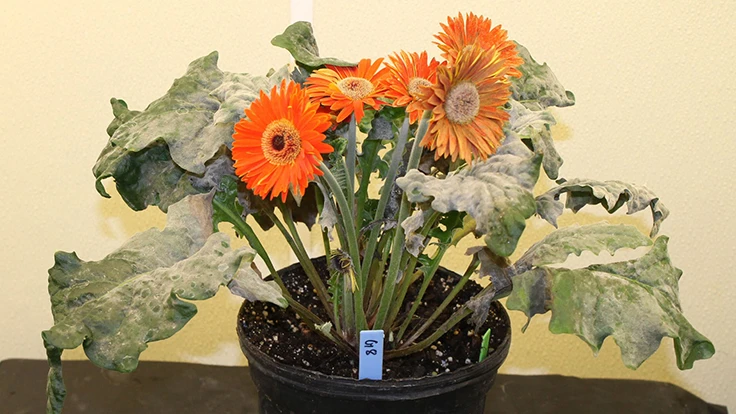
ALEXANDRIA, Va. – Nov. 3, 2015 – Powdery mildew is the most common and damaging disease for gerbera crops. The lack of disease-resistant gerbera plants has been a major limiting factor for crop production.
The American Floral Endowment's (AFE's) latest research report, Powdery Mildew Resistance in Transgenic Gerbera Plants, focused on increasing the plants' resistance to powdery mildew through gene transference.
Researchers Dr. Zhanao Deng, Zhonglin Mou and Natalia A. Peres of the University of Florida have concluded through this research that powdery mildew sensitivity can be overcome by transferring defense-related genes from non-crop plants to crop plants.
.jpg)
Severe powdery mildew on gerbera plants.
Results showed that genes from other plants can be transferred into gerbera crops to increase their resistance to powdery mildew. Regenerated plants had few mildew symptoms and better mildew resistance.
This information can be incorporated into breeding programs, and can help breeders manage diseases more effectively and control production costs. The study also offers the potential to develop disease-resistant varieties in other floriculture crops and for other diseases.
Visit Endowment.org for the full report and to access more than 150 free research reports covering disease management, insect management, post production, and more!
Latest from Greenhouse Management
- De Vroomen Garden Products announces new agapanthus variety
- Bug budget boom
- Plantpeddler announces details for Poinsettia Variety Day 2024
- ADVANCEA hosting greenhouse environmental control online course
- Making the switch: A guide to retrofit HID to LED lighting
- Tips for fast finishing
- Danziger announces InnovationFest Live Stream lineup
- Eason Horticultural Resources becomes 100% employee-owned through ESOP transition





